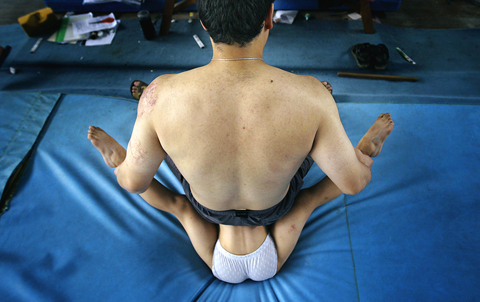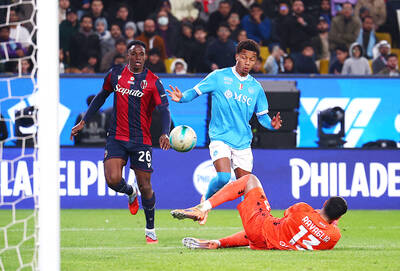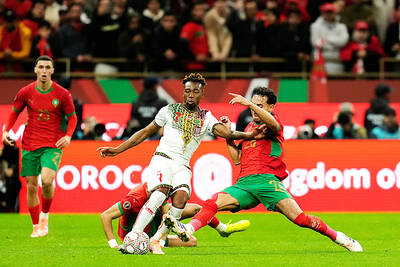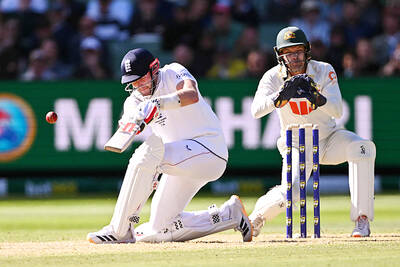If you believe — and many don’t — that Chinese officials have been truthful about the age of their tiny Olympic gymnasts, then the latest reports out of China might make you pause.
Authorities in the south of the country, using X-ray bone analysis because official ID cards seemingly cannot be fully trusted, have unmasked 2,113 young athletes — or perhaps not so young — who may have been fibbing about their age, Xinhua news agency said. That’s a failure rate of 15 percent, because Xinhua says 13,864 athletes were tested in all.
There’s no indication that any of the female gymnasts who won gold for China at last year’s Beijing Olympics were among those tested.

PHOTO: AP
‘VERY INTERESTING’
Nevertheless, the suggestion of widespread age-fakery in China is yet more food for thought for Andre Gueisbuhler, who as general secretary of the International Gymnastics Federation has been fielding the multitude of questions about whether China has competed with girls who were too young.
“Very interesting,” Gueisbuhler said of this week’s revelations from Guangdong Province. “It certainly proves that our doubts as to the age [of Chinese competitors] have a certain — how do you say — have a certain reality.”
Age-fraud is not unique to China. The physically fit have likely been passing themselves off as younger or older than they are since the Romans started conscripting armies. Major League Baseball is investigating 42 Dominican Republic prospects suspected of lying about their age when they signed professional contracts.
As elsewhere, cheating in China is motivated by the desire to win medals and make money.
But the really disturbing question with the Guangdong cases is why authorities there felt they needed X-rays to get to the truth.
What does that say about authorities’ trust in their own documentation? Does that mean official ID cards, the new anti-fraud kind with an embedded computer chip, that Guangdong athletes were told to present aren’t always reliable?
Maybe, because authorities also ordered athletes to submit to fingerprinting.
The same standards weren’t applied with China’s Olympic gymnasts.
FACE VALUE
The International Gymnastics Federation had to take at face value the passports, ID cards and other paperwork that China turned over in answer to persistent doubts that some of its girls at the Beijing Games may not have met the minimum age requirement of 16.
Gueisbuhler said that “for legal reasons” his governing body of world gymnastics is “simply not authorized to use X-rays or to use other scientific ways to check on the age” of competitors it has doubts about.
All it can do is verify their paperwork, and if there is “no contradiction between any of these documents there’s absolutely nothing we can do. So in this sense we have to trust the government.”
Perhaps so. But trust has clearly been getting shortchanged in the government-controlled world of Chinese sports. Only after the Beijing Games, when the international focus of attention had shifted elsewhere, have authorities there seemingly begun in earnest to expose the extent of age-fakery in sports.
In December, the basketball association said it found 36 players in China’s professional basketball league who were older than they originally stated. National head coach Li Yongbo said in October that it is a problem in badminton, too, and had “reached the point where we must speak about, discuss and resolve it,” the Changjiang Times quoted him as saying.
Guangdong conducted the bone-age analyses last year, Xinhua said.
In some cases, tests suggested that athletes were six or seven years over the limit for the age-group in which they competed. Based on the findings, sports officials are revising results from youth competitions in Guangdong last year.
In fact, bone X-rays don’t provide a perfectly accurate measure of real age and, with adolescents, readings can be off by months or even years, which makes Guangdong’s decision to employ them doubly curious. One can only guess that officials there must have had genuine misgivings about athletes’ ages to go to such trouble and expense.
MORE TO COME?
Shanghai Sports University professor Liu Qingzao said the problem is most prevalent in provincial-level competitions in China and he suggested that the Guangdong Province cases may just be the tip of the iceberg.
“It’s a good thing that they caught some of those athletes. But actually, they can catch even more,” he said.
Perhaps gymnasts will be next.
China’s girls at the Beijing Games were all cleared by their paperwork. But the International Gymnastics Federation is still investigating two members of China’s 2000 squad — Dong Fangxiao and Yang Yun. Discrepancies in Dong’s paperwork have suggested that she might have been 14 at the Sydney Games and Yang told Chinese state TV in 2007 that she was 14 at those Olympics.
Yang has subsequently said that she misspoke.

TOOTHLESS: Bologna never looked like finding a way back, and Antonio Conte and his substitutes were waiting to celebrate long before the final whistle SSC Napoli on Monday lifted the Italian Supercoppa with a 2-0 win over Bologna in Riyadh, David Neres netting both goals to earn the league champions a deserved victory over the toothless Coppa Italia winners. Neres opened the scoring with a stunning strike from distance six minutes before halftime and found the net again in the 57th minute when Bologna were caught trying to play out of defense. “We came here as champions of Italy, we wanted this trophy and we showed it with a great performance,” Napoli forward Matteo Politano told Mediaset. “We could have scored a few more goals, but

Backup quarterback Luke Weaver on Wednesday night threw a 22-yard touchdown pass to Nick Cenacle with 10 seconds left, as the University of Hawaii rallied for a 35-31 comeback victory over the University of California, Berkeley in a thrilling Hawaii Bowl. Weaver entered the game after Micah Alejado took a hard hit on the previous play. With the Rainbow Warriors (9-4) in range for a tying field goal, coach Timmy Chang took a shot at the end zone, and Cenacle got between two defensive backs and made the contested catch. “How amazing is that?” Chang said. “It’s a program that is built

Hosts Morocco on Friday were held to a 1-1 draw by Mali at the Africa Cup of Nations, ending their world record run of wins and leaving them still to make sure of progress to the next stage. Midfielder Brahim Diaz tucked away a penalty in stoppage-time at the end of the first half, but Mali equalized from the spot midway through the second half through Lassine Sinayoko. Both penalties were awarded after video reviews in a tempestuous clash at the end of a busy day of action at the tournament. Morocco were atop the Group A standings with four points, while Zambia,

An astounding 20 wickets fell on a frantic first day of the fourth Ashes Test yesterday, with Australia all out for 152 before storming back to dismiss England for 110 and leave the clash on a knife-edge. England skipper Ben Stokes won a key toss on a green track and his quicks feasted after sending in the hosts under overcast skies in front of 94,199 fans at the Melbourne Cricket Ground. It was the biggest cricket crowd ever at the cavernous arena, exceeding the 93,013 who watched the 2015 World Cup final, and they witnessed the home side collapse with Josh Tongue